Refilling your propane tank is easy and accessible in many locations. But is it safe to transport a propane tank in your car? Let's take a look below to see if it is safe to do so.
It is safe to transport a propane tank in a car if the tank is properly secured. Follow these steps to ensure that your propane tank is properly secured:
- The valves are closed.
- The propane tank is upright.
- The propane tank is secured.
- The propane tank is properly ventilated.
Knowing how to properly secure your propane tank will ensure that you and your family are safe while transporting it in your car. That's why in this article we will discuss the proper way to secure a propane tank in a car. In addition, we will answer other frequently asked questions about propane tanks, so read on!
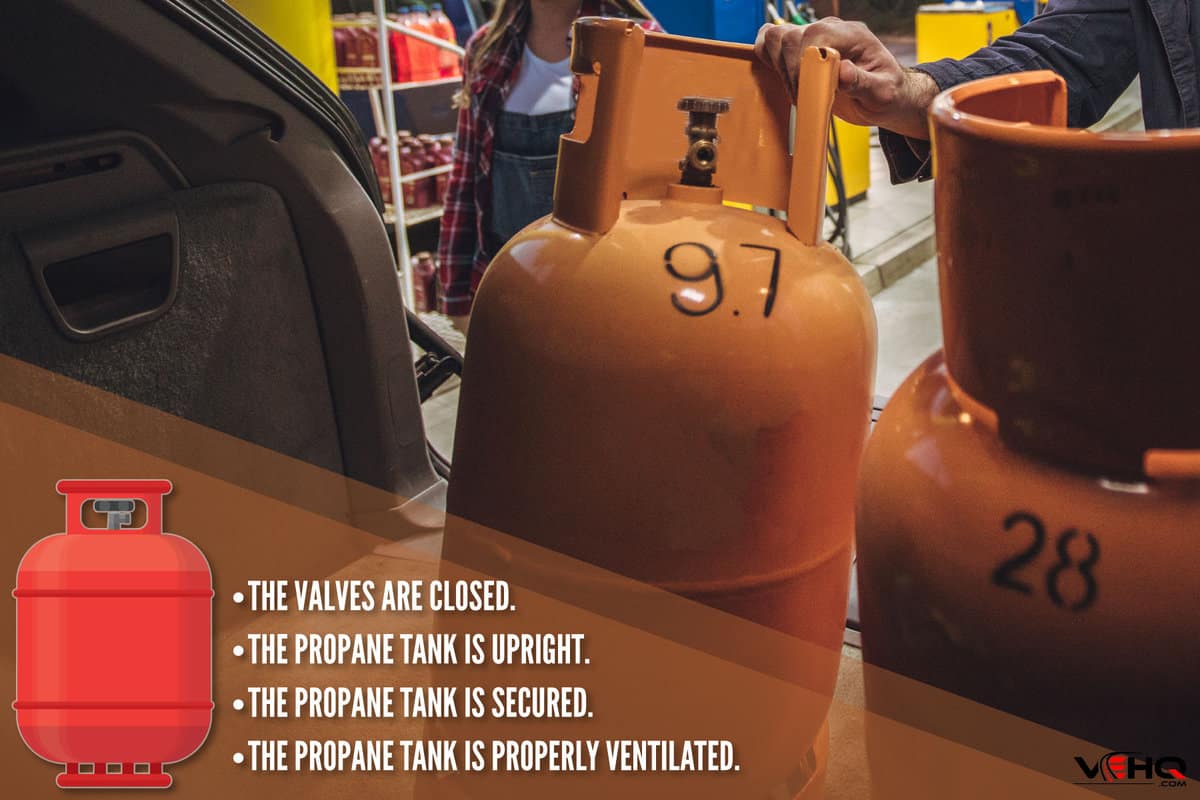
What Is The Best Way To Drive With A Propane Tank In A Car?
Propane is a safe and efficient fuel, but it is important to take the proper precautions when transporting a propane tank in a car. While not everyone has a pickup truck with a propane tank rack, there are still many ways to properly secure a propane tank in a car.
Some people choose to tie the propane tank down with rope or bungee cords. Others may opt for using ratchet straps. Either way, it is important that the propane tank is secured so that it cannot move around while the car is in motion.
With that said, let's walk you through the best way to drive with a propane tank in a car.
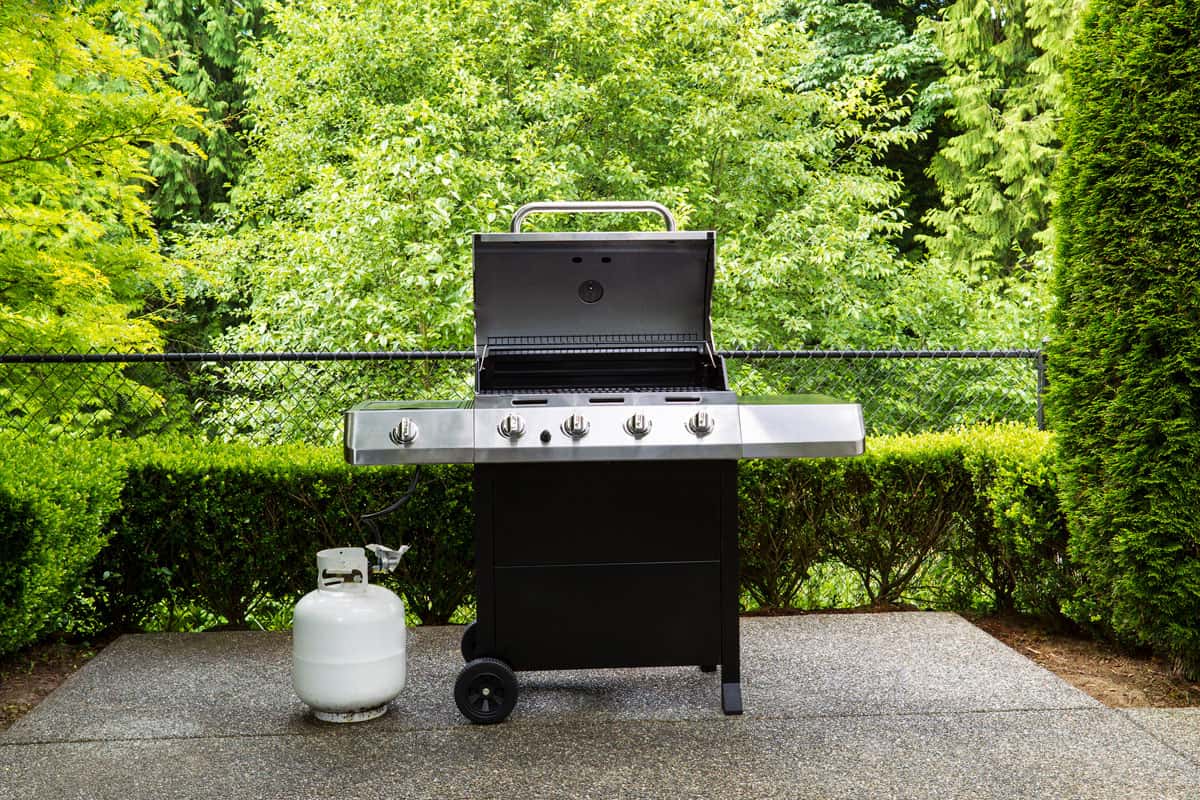
Close The Valves
First, you want to ensure that the tank valve is closed even if the tank is empty. If the valve is open, it could release propane gas into the car, which can be dangerous.
This is an easy first step but easily forgotten, so make sure that you close the valves before securing the propane tank in the car.
Ensure The Propane Tank Is Upright
Next, you want to make sure that the propane tank is upright. This may seem like a no-brainer, but it's an important step nonetheless.
If the propane tank is not upright, the gas inside can start to leak out. Not only is this dangerous, but it can also lead to a loss of pressure in the tank.
To avoid this, make sure that the propane tank is upright before securing it in the car.
Secure The Propane Tank
After you have closed the valves and ensured that the propane tank is upright, it's time to secure the tank. This can be done in a number of ways, but we recommend using ratchet straps.
Ratchet straps are easy to use and will keep the propane tank securely in place. If you don't have ratchet straps, you can also use rope or bungee cords.
For those who need to transport a propane tank in a car, then the back seat is a good option. Set the propane tank behind the passenger or driver seat so it won't tip over if the car makes a sudden stop.
With that said, don't put the propane tank in your trunk or cargo area. These areas are easy for the propane tank to tip over, and if the tank valve is open, it could release propane gas into the car.
Ensure The Propane Tank Is Properly Ventilated
After you have closed the valves and ensured that the propane tank is upright and secured, the final step is to ensure that the propane tank is properly ventilated.
This can be done by opening a window in the car or, if the weather is warm, by turning on the air conditioning.
If the car isn't properly ventilated, then the heat can cause the pressure in the propane tank to build up, which can be dangerous. This is especially important when the propane tank is full.
By following these steps, you can be sure that your propane tank is properly secured in your car. This will help to keep you and your family safe while transporting the tank.
Will A Propane Tank Explode If Hit By A Car?
It's tough to say for sure if a propane tank will explode if hit by a car. While it is unlikely, it is still possible.
The best way to avoid this is to make sure that the propane tank is properly secured in the car. This will help to prevent the tank from being damaged in a collision.
In addition, you should always close the valves on the propane tank before transporting it in a car. This will help to prevent any gas from leaking out and potentially causing an explosion.
If the valve does open and any open flames are present, then there is a possibility that the propane tank could explode. However, this is not very likely.
Will A Propane Tank Explode In The Sun?
It's possible for a propane tank to explode in the sun, but it's not very likely.
The main reason for this is that the pressure inside the propane tank will increase as the temperature rises. This can cause the tank to rupture and explode.
For example, on a 100-degree day, the inside of a vehicle is much hotter. If you don't air condition your car or open your windows, a full propane tank could potentially explode.
With that said, it's better to play it safe and not leave a propane tank in your car on a hot day. If you must, then be sure to open the windows and turn on the air conditioning.
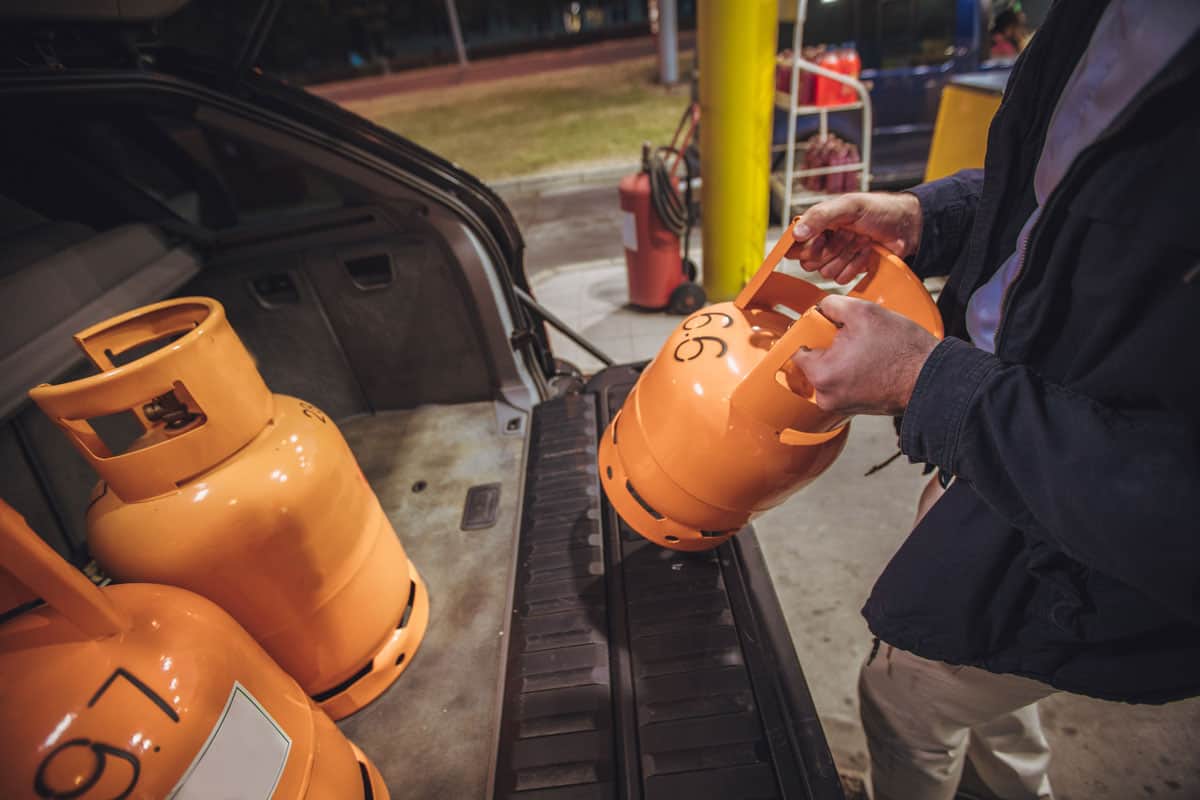
How Hot Can A Propane Tank Get?
In general, a propane tank shouldn't get hotter than 120 degrees Fahrenheit. At this temperature, the propane tank can leak or combust.
If you are using your propane tank in a hot environment, then it's important to keep an eye on the temperature. If it starts to get too hot, then you should move the propane tank to a cooler location.
In addition, if you are transporting a propane tank in a truck bed, then be sure to cover it. This will help to keep the tank from getting too hot in the sun.
How Much Does It Cost To Fill A Propane Tank?
Most homeowners have a 20-pound propane tank. These tanks typically cost between $15 and $30 to fill.
The cost of filling a propane tank will vary depending on the size of the tank and the current price of propane. Like other fuel prices, the cost of propane can fluctuate.
If you're not sure how much it will cost to fill your propane tank, then call your local propane company. They will be able to give you an estimate based on the current price of propane.
What Should You Do If Your Propane Tank Is Leaking?
If your propane tank is leaking in your car or at home, then you will need to take action. First, you will know there is a leak if you can smell propane. Propane has a strong distinct odor that is often described as smelling like rotten eggs.
If you smell propane, then the first thing you should do is ventilate your car or home. Open all of the windows and doors to get rid of the gas.
Next, you will need to turn off the propane tank. There is a valve on the tank that you can turn to the "off" position.
If the propane tank is leaking in your car, then you will need to pull over and turn off the engine. Exit the vehicle or put the propane tank in a shaded or cool area.
Once you have taken these steps, you will need to call your local propane company. They will be able to send someone out to fix the leak or replace the propane tank.
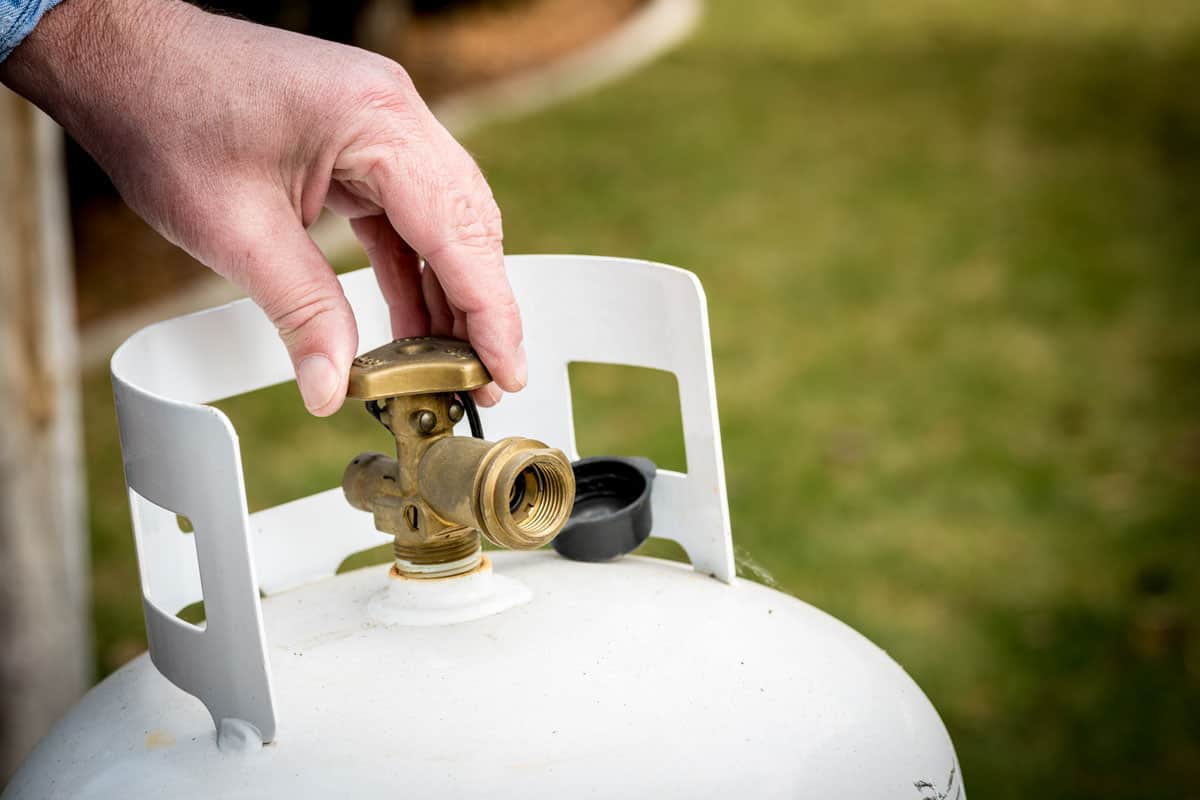
How Do You Know A Propane Tank Is Empty?
If you need propane for a barbecue or other reasons, then you may be wondering how to tell if the tank is empty. The best way to do this is to weigh the propane tank.
A full 20-pound propane tank should weigh about 37 pounds. When empty, a propane tank will weigh around 17 pounds.
You can do this by using an at-home scale or by taking the propane tank to a local propane company. This way you can save yourself a trip if the tank still has enough propane.
You can also tell if a propane tank is empty by the pressure gauge. On a full tank, the needle should be in the green zone. When the tank is getting low, the needle will move into the yellow or red zone.
Final Thoughts
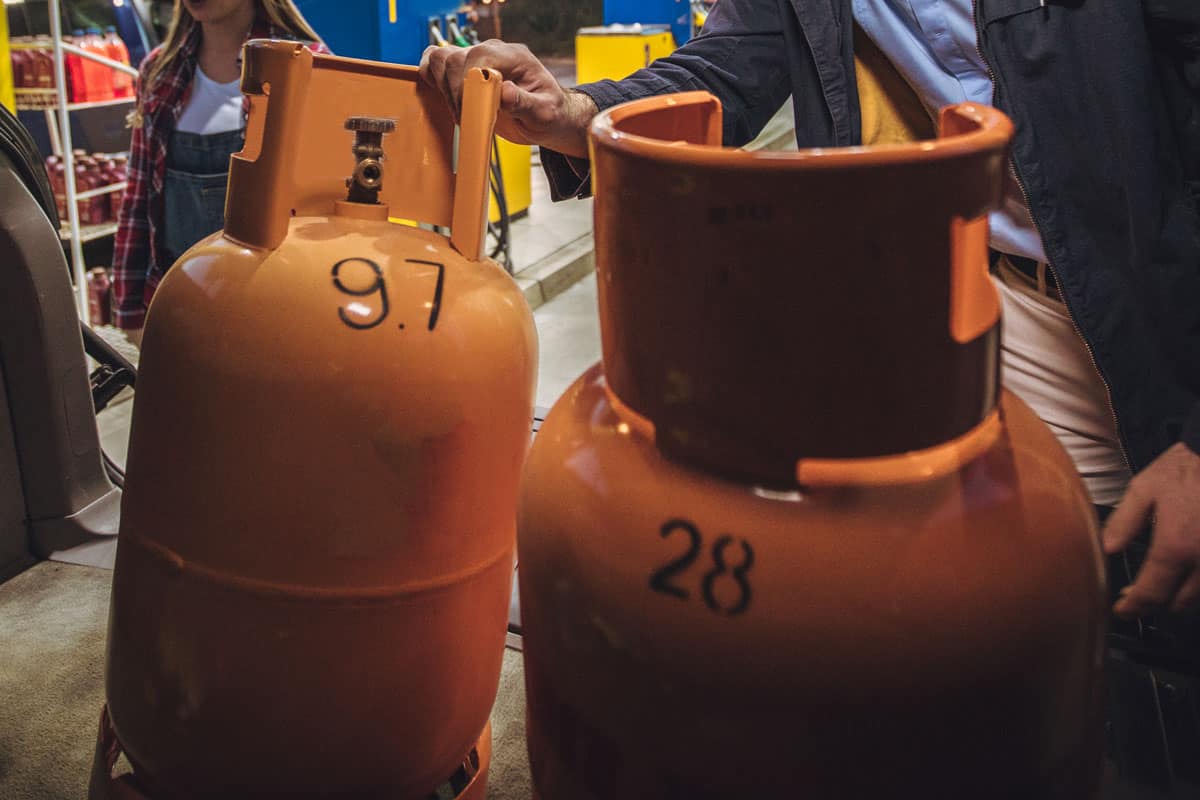
By properly transporting and storing your propane tank, you can help to prevent accidents. If you do have a propane leak, then be sure to take action right away and call your local propane company.
Made it to the end? Here are other articles you might find helpful:
